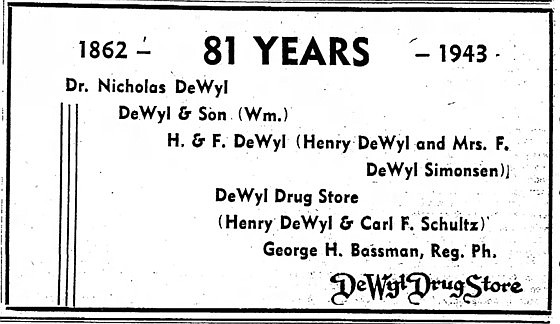Being a druggist was a fairly lucrative business that didn't require school or a license until the end of the 19th century. One of the early names in the Jefferson City pharmacy history is DeWyl.
Dr. Nicholas DeWyl opened a drug store with Herman Bruns, son of early mayor Dr. Bernard Bruns, in 1862 at 111 E. High St. His daughter, Fredericka, was the first woman licensed as a pharmacist in Missouri.
DeWyl left his home of Alsace-Loraine to complete his medical training in 1848 at the University of Berne, Switzerland, then gained a reputation by combating native fevers in South America.
He practiced in New Orleans, where he met and married his wife, Josephine, before coming to Missouri. Before the war, he set up his medical practice, operated a general store and served as postmaster at what he named Osage Bluffs.
During the Civil War, he moved his family of seven to Jefferson City and operated a medical practice with the Rev. Joseph Rieger, working at the Central Evangelical Church parsonage and in the soldier camps, Old Munichburg historian Walter Schroeder said. He also served as prison physician under Warden H.A. Swift.
DeWyl had changing business partners and different East High Street locations during its 70-plus-year history. In 1865, Dr. DeWyl's Drug Store on High Street included "pure cold soda water, new non-corroding fountain, drugs and medicines, perfumeries, fine cigars, liquors, paints and dye stuffs."
In 1872, his partner was Mr. Nagel, and they moved into 212 E. High St., which formerly had been the Berri Drug Store.
Frederick Berri, another druggist from Switzerland, had arrived in Jefferson City in the 1840s, operating a drug store out of a two-room log cabin with his wife, Amalia. In 1865, Frederick committed suicide. Amalia continued to operate the business until she was murdered by her brother, who then committed suicide, in 1871.
DeWyl's eldest son, William, who died in 1890, became partner in 1886, when the store was at 227 E. High St. Fredericka began working as a druggist in 1887, and her brother, Henry, attended St. Louis College of Pharmacy. Henry received his pharmacy license in 1890 and Fredericka in 1891; then, the elder DeWyl retired in 1892. The store eventually relocated to 229 E. High St.
Nicholas DeWyl also owned Riverside Vineyard, a mile east of downtown, where he raised grapes, sold an assortment of vines and kept a wine cellar holding 1,000 gallons. In 1871, he sent half a dozen bottles of Virginia seedling wine to Gov. B. Gratz Brown "to show what Cole County can do in this very important branch of industry." In 1873, he won the county fair premium for Herbemont orchard.
Henry DeWyl operated the family drug store with his sister until she married and retired in 1904. He continued alone until 1923, when he took on his cousin, Carl Schulz, as partner. Henry was involved in the community's campaigns for roads and to keep the Capitol, as well as the Osage River bridge over U.S. 50.
At one time, the Commercial Club's tables and chairs were dedicated to his memory. He served as president of the Commercial Club from 1897-98 and was on the board of the Capital City Building and Loan Association and Jefferson City Bridge and Transit Company.
Fredericka, who went by Ricky, was a charter member of the Council of Clubs, helping organize the community nurse program. And she was involved in significant landscaping projects of Central Missouri highways. She also was a member of Central Evangelical Church, Hawthorn Garden Club, Olive Ewing Dallmeyer Music Club and the Art Club.
She married mechanical engineer Ernst Simonsen, a native of Sweden. Simonsen arrived in America in 1881 and moved from the east coast to Jefferson City in 1889. He purchased the Jefferson City Foundry, renaming it the Simonsen-Walther Manufacturing Company. In 1894, he and P.H. Loethen created Jefferson Heating Company, doing general hot water and steam heating business for most of the prominent buildings of the day.
The Simonsens were active in civic affairs, particularly education. She was a member of the school board for many years, serving as president during the addition of the junior college.
They made several gifts to the Jefferson City Public Schools through the years. The first was manual training and home economics equipment. The last was an intercommunication system. When she died in 1947, students at Simonsen Junior High School paid tribute to her by conducting a memorial service over that system.
Michelle Brooks is a former reporter for the Jefferson City News Tribune. She enjoys researching local history. Story ideas may be sent to [email protected].

